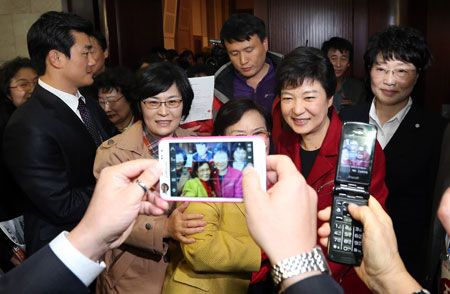
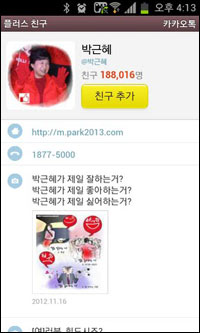
Utilizing social media was an important part of Barack Obama’s consecutive successes in the two U.S. presidential elections. It remains to be seen whether services such as Twitter and Facebook will play a similar pivotal role in Korea where voters will elect a new president on Dec. 19.
Social media has dramatically reshaped the way people communicate and form their opinions thanks to the pages of running dialogue and ubiquitous accessibility, enabled through mobile Internet devices such as smartphones.
Korea’s three main presidential hopefuls ― Park Geun-hye of the ruling Saenuri Party, Moon Jae-in of the Democratic United Party (DUP) and independent contender Ahn Cheol-soo ― have bombarded voters with social media messages for months and are now doing so with greater frequency as the race comes down to the wire.
But each of the three camps appears to be different in their approach to social media as well as the platforms they struggle and strive to represent.
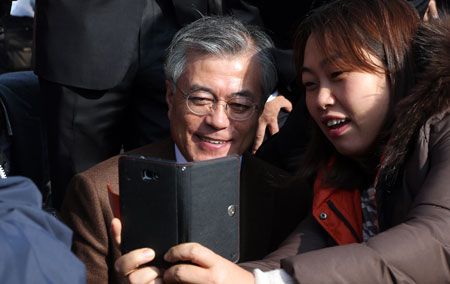
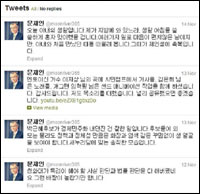
Moon, who is in talks with Ahn over deciding who between them will become a unified candidate to stand against Park, is most active on Twitter, which allows users to broadcast short form status updates. As of Monday morning, Moon had “tweeted’’ 1,613 times and garnered 287,809 followers. Ahn had 456 tweets and 235,129 followers, while Park posted 98 messages and had 99,428 followers.
Moon has been aggressively using Twitter to express his views on political issues, outline his social agenda and foreign policies and also to boost a grassroots movement to raise funds for his campaign. Moon’s tweets about Park and the paradoxical legacy left behind by her father, the late dictator Park Chung-hee, regarded in Korea as both a political oppressor and a successful economic strategist, created a stir.
Cho Han-ki, Moon’s social media chief, said that online communication has a critical part in Moon’s political philosophy of “communication and participation.’’
“When you rely only on official speeches and news conferences, there will be obvious communication barriers between the candidates and the public. However, this is a gap that can be filled ideally through social media, which enables interaction,’’ Cho said.
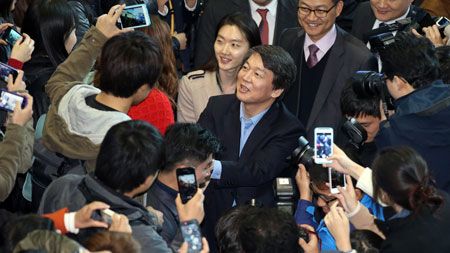

While Moon is the undisputed king of Twitter among presidential contenders, Ahn is a rival in the realm of Facebook. Of course, there is no exact way to measure supremacy between the candidates through responses on Facebook. But solely using the number of “Likes’’ gathered by their postings, Ahn leads Moon by 72,370 to 66,425.
Park’s presence on Facebook is rather subdued. She rarely leaves anything on her page, which is now filled with random photos and links from her online supporters, who have hit the “Like” button 13,637 times.
One Ahn supporter says Facebook helps voters shape personal views of the candidates and develop trust for them.
“Facebook is my primary source from where I get most of my information about Ahn and the election. The updated messages and pictures about him pop up on news feed whenever I log in, so I feel intimacy with the candidate through knowing what and how he is doing during his campaign,’’ a 23-year-old college student said.
“Given the fact that people in their 20s are mostly disinterested in politics, I think, using a personal approach through social networking services (SNS) can be an effective way of luring young voters.’’
Ahn has been branching out over to Internet video, an area which Moon and Park have yet to touch. Since last month, Ahn’s camp has been operating an Internet broadcasting system where videos of his campaign activities are uploaded as well as live debates on policies and political issues. The videos so far have garnered around 294,000 hits and given him a presence on YouTube.
Ahn’s benefit from his social media activities is at least 28 billion won (about $25.7 million). That is the money his camp has so far managed to collect through grassroots campaign funding after launching the program on Nov. 13 and endorsing it mainly through social media.
While Park isn’t much of a force on Facebook or Twitter, she is very visible on Kakao Talk, a mobile-phone instant messaging service with more than 40 million users. Park has 186,317 followers, who regularly receive feeds from her camp, which produced the Kakao Talk slogan, “A female president is the first step for change and renovation.’’ Ahn and Moon have 179,772 and 157,229 followers respectively.
Kakao Talk’s Plus Friend functions allow famous people and companies to enjoy individual space where photos, videos, messages as well as Facebook and Twitter links are updated. When Ahn temporarily broke off talks with Moon over the single candidacy, one of the first things he did was address his Kakao Talk followers.
According to a survey by Mono Research in August, about 60 percent of respondents said they expected social media to have some influence in the outcome of the election, with nearly 23 percent expecting the impact to be “critical.’’
However, some voters believe that the candidates’ growing reliance on social media could prove to be a double-edged sword.
“The candidates’ frequent exposure on SNS can also hurt them because their comments or pictures are often put on the chopping block where they get a lot of flak from random people. So, it is important for them to think twice about how often and to what extent they expose themselves via SNS,’’ said Choi Moon-jung, a 27-year-old office worker.
After the last election, Obama posted a picture of himself hugging his wife Michelle on Twitter. And it soon became the most re-tweeted photo, shared by more than 816,000 people.
On the other hand, the Republican challenger Mitt Romney had a bitter taste of social media when his comment in a video clip recorded on a hidden camera went viral via YouTube during his campaign, drawing instantaneous worldwide criticism.
In the video, Romney said, “There are 47 percent of the people who will vote for the president no matter what. All right, there are 47 percent who are with him, who are dependent upon government, who believe they are victims, who believe government has responsibility to care for them…”
People in their 20s and 30s make up almost 30 percent of the nation’s total population and they are 42.6 percent of all smartphone users, according to data from the Korea Internet Security Agency in August. These people are expected to be voters most influenced by the social media experience.
Maximizing the impact of social media for elections is an international trend, and whoever misses the trend will be forced into an unfavorable position, said Kweon Sang-hee, a Sungkyunkwan University professor of mass communication and journalism, noting “History shows that candidates who capture voters’ hearts by capitalizing on up-to-date communication channels ended up achieving success.”
“Former U.S. President Franklin D. Roosevelt’s fireside chats in the 1930s made him one of the most popular Commander-in-Chiefs during the golden age of radio. Also, John F. Kennedy’s better delivery against Richard Nixon in the first presidential TV debates opened the door of the White House for him,” Kweon said. “Bill Clinton utilized cable TV channels well and Obama has done a great job of using SNS since the beginning of his political career.”
How SNS are used could possibly be a “game changer” again in the upcoming election here, Kweon concluded. <The Korea Times/Jung Min-ho>




